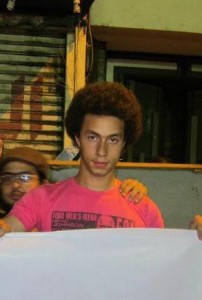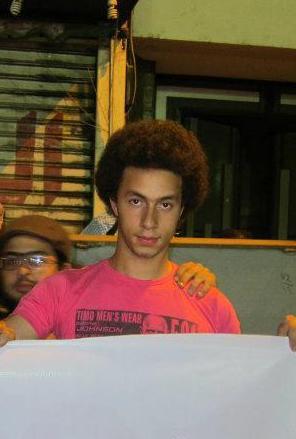
(Photo: Gaber Salah)
Public domain
The family of Gaber “Jika” Salah filed a lawsuit on Sunday demanding the enlistment of their son as a “Martyr of the 25 January Revolution”.
Jika, a 6 April Movement and Al-Dostour Party member, was shot in November 2012 near Mohamed Mahmoud Street amid clashes between protesters and security personnel.
The Egyptian Centre for Economic and Social Rights (ECESR) filed the lawsuit on behalf of Jika’s father, Salah Gaber Salah. The lawsuit is filed against President Mohamed Morsi and Prime Minister Hesham Qandil for refraining from having Jika enlisted as a “martyr”.
Mahmoud Belal, a lawyer and member of the ECESR criminal justice unit, said that due to the lack of clear criteria to determine who is to be considered a martyr, the matter is ultimately left to Morsi and Qandil’s judgment.
Belal stated that, acting on behalf of Salah, the ECESR issued requests to all administrative authorities to enlist Jika as a martyr. When they received no response, it was considered a “passive decision [of refusal]”, which they challenged through their lawsuit.
“We will always have a problem as long as only the ruling regime can decide who’s a martyr and who isn’t,” Belal said. “If former President Hosni Mubarak was still in power, then those who died during the 18-day uprising in 2011 would not have been considered martyrs.”
Article 65 of the constitution states that those dubbed martyrs of the 25 January Revolution and other national events are to be honoured according to the law. It adds that their families are to be cared for and given employment priority.
Khaled Ali, ECESR director, stated that Jika’s family would give away any amounts of money they might get if their son is enlisted as a martyr to the Children’s CancerHospital (57357).
“My son’s is priceless,” Salah told ECESR. “If the public prosecution hasn’t yet collected criminal evidence regarding my son’s murderer, this won’t deter me. I will defend my son’s rights until the last day of my life.”
In November 2011, deadly clashes on Mohamed Mahmoud Street lasted for five consecutive days between protesters and the police, amid claims that demonstrators were attempting to raid the Interior Ministry. Protesters had gathered on the same street to commemorate the first anniversary of the clashes a year later when those protests soon turned violent, leading to Jika’s death.

